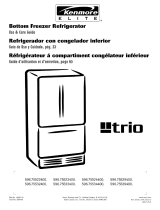
These Guidelines Must Be FoHowedTo EnsureThat
Safety Mechanisms InThis Refrigetat0rWill Operate
Properly.
ELECTRICAL iNFORMATiON
• The refrigerator must be pJugged into its own
dedicated 115 Volt, 60 Hz., AC only electric outlet.
The power cord of the appliance is equipped with a
three-prong grounding plug for your protection against
electrical shock hazards, it must be plugged directly
intoa properly grounded three-prong receptacle. The
receptacle must be installed in accordance with local
codes and ordinances. Consult a qualified electrician.
Do not use an extension cord or adapter plug.
• Immediately repair or replace any power cord that
becomes frayed or damaged.
• Never unplug the refrigerator by pulling on the power
cord. Always grip the plug firmly, and pull straight out
from the receptacle to prevent damaging the power cord.
• Unplug the refrigerator before cleaning and before
replacing a light bulb to avoid electrical shock.
• Performance may be affected if the voltage varies by
10% or more. Operating the refrigerator with insufficient
power can damage the compressor. Such damage is
not covered under your warranty.
• Do not plug the unit into an outlet controlled by a wall
switch or pull cord to prevent the refrigerator from being
turned off accidentally.
• Avoid connecting refrigerator toa Ground Fault Interruptor
(GFI) circuit.
iMpORTANT: Pressing and ho!ding the On/Off button
f013 seconds,!0cated on the le{t side of the
temperature contro ! panel, wil! disab!e YOUr
reffigeratorls cooling system, but does not disconnect
the P0wer to the light bu!b and other e!ectrica!
components, Totum off pOWertOyou r refrigerat0r you
must unP!ug the p0wer c0rdfromthe wa!! outlet:
Grounding type
wall receptacle
PoWerc0rd With
3-prong grounded plug
KENMORE ELITE APPLIANCE WARRANTY
One Year Limited Warranty
When installed, operated and maintained according to all
instructions supplied with the product, if this appliance fails
due to a defect in material or workmanship within one year
from the date of purchase, call 1-800-4-MY-HOME ® to
arrange for free repair.
FULL FIVE YEAR LIMITED WARRANTY ON SEALED
REFRiGERATiON SYSTEM
For five years from the date of purchase, when this
appliance is installed,operated, and maintained
according to the instructions supplied with it, Sears will
repair the sealed system (consisting of refrigerant,
connecting tubing, and compressor), free of charge, if
defective in material or workmanship.
If this appliance is used for other than private family pur-
poses, this warranty applies for only 90 days from the date of
purchase.
This warranty covers only defects in material and
workmanship. Sears will NOT pay for:
1. Expendable items that can wear out from normal use,
including but not limited to filters, belts, light bulbs and
bags.
2. A service technician to instruct the user in correct product
installation, operation or maintenance.
3. A service technician to clean or maintain this product.
4. Damage to or failure of this product if it is not installed,
operated or maintained according to all instructions
supplied with the product.
5. Damage to or failure of this product resulting from
accident, abuse, misuse or use for other than its
intended purpose.
6. Damage to or failure of this product caused by the use of
detergents, cleaners, chemicals or utensils
other than those recommended in all instructions
supplied with the product.
7. Damage to or failure of parts or systems resulting from
unauthorized modifications made to this product.
Disclaimer of implied warranties; limitation of remedies
Customer's sole and exclusive remedy under this limited
warranty shall be product repair as provided herein. Implied
warranties, including warranties of merchantability or fitness
for a particular purpose, are limited to one year or the
shortest period allowed by law. Sears shall not be liable for
incidental or consequential damages. Some states and
provinces do not allow the exclusion or limitation of inciden-
tal or consequential damages, or limitations on the duration
of implied warranties of merchantability or fitness, so these
exclusions or limitations may not apply to you.
This warranty applies only while this appliance is used in the
United States and Canada.
This warranty gives you specific legal rights, and you may
also have other rights which vary from state to state.
Sears, Roebuck and Co., Dept. 817WA, Hoffman Estates,
IL 60179
Sears Canada Inc.,Toronto, Ontario, Canada M5B 2B8





























